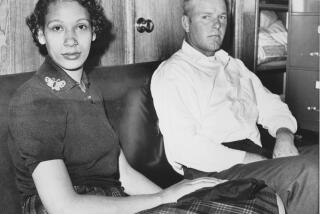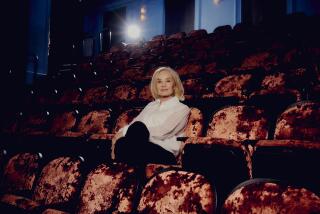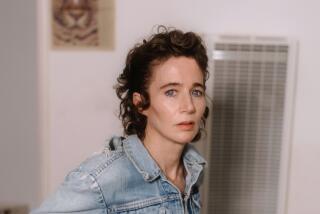The Aging Heart : FICTION : LOVE, AGAIN.<i> By Doris Lessing (HarperCollins: $24; 352 pp.)</i>
- Share via
‘She dressed carefully. Women of a certain age (and older) have to do this. . . . In the glass she saw a handsome woman in white linen who had about her a dewy look. . . . This was because of the elixirs romping in her blood. Her whole body ached. . . .”
It is with guarded fascination that we read of someone from our senior tribe who expresses her sexual feelings, someone who is still “bursting into flame.” Does erotic desire wax and wane and wax again, in perpetuity, until the final curtain?
The ambitious construct of Doris Lessing’s new novel, “Love, Again,” is a small, intrepid London theater company known as “The Green Bird.” Here is a cast of characters--players, writers, directors, benefactors and, at its center, a commanding older heroine, Sarah Durham. Sarah, a becalmed widow for 20 years, discovers that at 65, “she has somehow invited the attentions of several younger men. She is alarmed when she succumbs to flirty asides from a handsome young actor, known to the company as “the pretty hero,” who happens to be 40 years her junior! Seemingly overnight, Sarah becomes a love object after years of sexual dormancy. “Sexlessness? Well no, for she sometimes masturbated. . . . She had perfected the little activity.”
With the theater’s adaptation of a romantic story about a real-life French heroine, a ravishing quadroon (Julie Vairon) whose doomed love affairs indeed make for a perfect stage play, there occurs an unnerving transformation in the players. As the play is rehearsed, romantic love sweeps through the small production company. Much of the hormonal disturbance is directed toward Sarah, the “sensible” matron, whose calm and business expertise had been the backbone of the little company.
As in Chekhov’s play “The Sea Gull,” which uses the device of a “play within a play,” Lessing evokes a love story within a love story. In each, the seed story multiplies as if in a dish of agar. In Lessing’s play, the heroine, Julie Vairon, bewitches everyone, engendering dated courting routines. Letters are slid beneath doors at all hours. Flowers are sent in a jumble of bouquets as suitors stake their claims.
The theater’s primary benefactor, a British aristocrat who comes equipped with his own elaborate country estate, “Queen’s Gift,” at which the play will be hosted, falls in love with the dead (yes, dead) quadroon. He befriends Sarah and together they sort through their inscrutable urges; unfortunately, his hopeless affair brings his suicide before the end of the novel.
There are funny and tense encounters and delicious descriptions of natural France and England beneath the fawning human scrim. With all these goings on, why not at least one consummation? Lessing has avoided all sex acts. The story is revealed in Sarah’s painful introspection. It’s all in her head. Her ruminations go on for pages. Scene after scene, Sarah retreats to her perch at a hotel window, where she spies on her associates in the cafe below, a voyeur in her own love triangle. Most irritating is Sarah’s mannerism of quoting romantic poetry. Lessing delights in a miscellany of literary quips, dribs and drabs dragged out from a bevy of old masters: Browning, Goethe, Byron, Tennyson, Dryden, Sappho and on and on. Sarah’s paramours counter with the same archival passages and no one seems capable of coming up with their own words.
Fans of Lessing know her as one of the great realist writers of the century. Why then, in “Love, Again” does she avoid a deeper psychological scrutiny? These characters seem airbrushed like familiar TV types and at times become farcical. The soap opera short-takes of adolescent couplings against the backdrop of the British country estate creates a comic hybrid of “Melrose Place” and “To the Manor Born.”
Another peculiar element in the book is the strange embodiment of a musical effect in the script of “Julie Vairon.” Excerpts from Julie’s diary are sung in eerie, suffocating exchanges quite reminiscent of the “Umbrellas of Cherbourg.”
Sarah’s dilemma as rickety femme fatal is not candid enough. Lessing’s reticence seems out of character. In her early pentology, “Children of Violence,” and in her peerless feminist novels “The Golden Notebook” and “The Summer Before the Dark,” Lessing exfoliates layers of the human organism and the heart of the conflict is autopsied even before it ceases to beat. Frayed bonds are explored, whether it be the tethers that entrap lovers or the sticky familial webs and dangerous societal and patriarchal imprisonment that threaten her characters.
In “Love, Again,” Lessing seems unwilling to fully explore the terrain of sex and instead submerges the reader in Sarah’s swooning symptoms. The best we get is repetitive descriptions of this “whirlpool,” until the whole thing washes over the dam.
Strong moments do occur when Lessing describes her character’s marred childhood. Sarah has recurring dreams of an idyllic love lost to childhood: “She could not match this particular degree of being in love with anything in her adult life.” Other memories find her locked in her room where she mutilates her doll.
Then there is Sarah’s lifelong jealousy of her younger brother, who, upon his birth, boosted her from her mother’s lap. Ironically, his grown daughter comes to Sarah for guidance. A druggy girl right off the streets, she stops in for a handout or to get her aunt to do her laundry. Clearly, Sarah is bound to the girl for more reasons than mere empathy. This relationship has much more resonance than the relentless romantic hawings that take up most of the novel.
Lessing explains that younger men might seek Sarah’s company to make up for affronts and lapses in their relationships with their matriarchs. In one stinging observation she writes: “There are men who carry with them, as some half-grown fishes are attached to yolk sacs, the shadow of their mothers.” But one does wish that she might have avoided the cliched descriptions of her heroine’s sexual chaos: “She was raging with desire.” Readers still want the tense erotic scenes Marguerite Duras created without blinking, or even the exquisite pent-up frenzy reached by Edna O’Brien’s isolated crones.
But Lessing is not going to show us her sexagenarian in a state of undress. Maybe she knows better. Certainly, she is not writing a companion volume to “Straight Talk on Menopause.” Instead, Lessing is trying to find the right balance of acceptance in the face of our despair in our aging.
The author writes: “A woman of a certain age stands in front of her looking-glass naked . . . she always did have good shoulders. And a very good back. . . . Her body had been a pretty good one . . . when a subtle disintegration set in . . . areas were surfaced with fine velvety wrinkles like an elderly peach.”
At what age must Sarah leave the stage of erotic love? How many seasons will it play? Because Lessing, surprisingly, was too genteel to fully inform her readers, they might just have to reach their sixth decade in order to understand. For some of us, that’s not too long to wait.
More to Read
The biggest entertainment stories
Get our big stories about Hollywood, film, television, music, arts, culture and more right in your inbox as soon as they publish.
You may occasionally receive promotional content from the Los Angeles Times.










